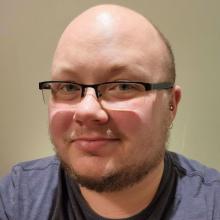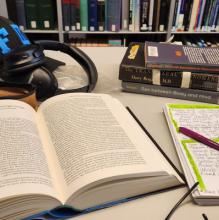John Harvey O'Hara
Why did you decide to pursue a graduate degree?
I chose to pursue a graduate degree because my research interests necessitated it. Since I took an undergraduate class on the Weimar Republic, I have wanted to examine issues like trans life in the early 20th century, and I developed more questions than answers during my previous degrees. I realized that I could answer these questions better with the training and resources that came with a supportive doctoral program.
Why did you decide to study at UBC?
I decided to study here because the CENES department is a hub for queer German studies, and there are few places like it in the world. The mentorship and sense of community here have encouraged me greatly as I've developed my project further. I also selected UBC because I wanted to leave the United States for my doctoral program, and UBC is ideal for this -- it's far enough from my home region for me to grow as a scholar, but it's also close enough that I can visit my partners, friends, and family in the United States.
What is it specifically, that your program offers, that attracted you?
This program was particularly attractive to me because I can perform interdisciplinary research that examines cultural, literary, and historical perspectives. I'm working with scholars in areas like queer studies, media studies, and disability studies, and their mentorship has already greatly expanded how I think about my own work.
What was the best surprise about UBC or life in Vancouver?
It's the size and diversity of life on the Vancouver campus. I previously studied at suburban community colleges and a very urban university, and so it was lovely to move to UBC. Tucked between the sea and Pacific Spirit Park, this campus really feels like a small city all its own, and it's really nice to see students of varying ages and even families on campus.
What aspect of your graduate program do you enjoy the most or are looking forward to with the greatest curiosity?
I really enjoy the sense of community within my department -- it's not uncommon to hear laughter if you're visiting our floor! This environment fosters collaboration among the graduate students, and so the graduate office is a place for working together and encouraging each other's projects.
What do you see as your biggest challenge(s) in your future career?
As a disabled and trans scholar, the biggest challenge will be finding a position where my family and I will be safe. Given political shifts in my home country, I question whether it would be wise to return there after I finish my program, and my greatest goal will be finding a professorship where I can do research, teach, and live safely.
What aspects of your life or career before now have best prepared you for your UBC graduate program?
I'm a nontraditional student with a varied background, and the mixed bag of skills I've developed has really helped. My most directly useful skills are essay writing, which I learned from fabulous teachers; language skills in Latin and German, which also came from wonderful instructors; and medical knowledge from a previous career in healthcare settings. Because my research focuses heavily on early sexology, I use all of these in my day-to-day work.
What do you like to do for fun or relaxation?
I keep a small garden in my apartment, and I enjoy exploring the landscape around the Vancouver campus, which is very different from my home region of Chicago. I also spend time with my friends and partners by playing Dungeons and Dragons.
What advice do you have for new graduate students?
My best advice is to access all the resources you think you might need, whether it's accommodations from the Center for Accessibility or assistance from your supervisor. Graduate school is an incredibly busy time, and it's important to ask for help.

